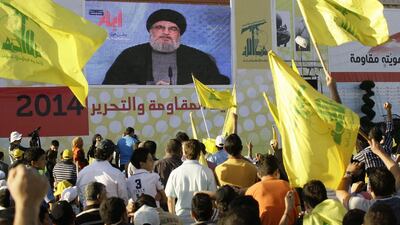Beyond the bombastic talk and threats of a second full-scale confrontation between Israel and the Lebanese juggernaut Hizbollah, experts describe a more complex landscape that is more likely to make both sides count to ten before triggering another conflict.
“The clouds of war are gathering … Hizbollah is preparing for war,” US ambassador to the UN Nikki Haley told the Security Council last week, sounding the alarm on risks of an imminent conflict between Hizbollah and Israel after 11 years of relative quiet since the 2006 war.
Ms Haley’s grim testimony on the situation in southern Lebanon and calls for more monitoring by the United Nations Interim Force in Lebanon (Unifil) was preceded by plenty of sabre-rattling from both Iran-backed Hizbollah and Israel this summer.
Hizbollah chief Hassan Nasrallah said the next confrontation could be inside Israel, which “will suffer the same defeat that it suffered in 2006, but with greater force”. Meanwhile, former Israeli defence minister Moshe Yaalon told the Arabic news website Elaph that “if [Iran’s supreme leader] Khamenei wants war, then Lebanon will go to war, and every Lebanese will suffer from the next war because all infrastructure will be destroyed”.
According to a recent report, The Low-Profile War Between Israel and Hizbollah, by the Begin-Sadat Centre for Strategic Studies, the Iran-backed party has more than doubled its capability since 2006.
“Hizbollah has been able to build one of the largest projectile arsenals in the world”, estimated to be between 120,000 to 140,000 rockets and missiles, said the report. The number of fighters has also increased to 45,000 from 17,000 in 2006.
However, experts argue that the build-up does not necessarily mean a war is imminent, and could even be a preventive tactic by Hizbollah.
Hanin Ghaddar, a visiting fellow at the Washington Institute for Near East Policy, told The National: "For Hizbollah, this is not the time for another war with Israel."
A confrontation with Israel would jeopardise Hizbollah's other regional priorities, she said.
“At a time when Hizbollah and Iran are winning the battles in Iraq, Syria and Lebanon, why would they risk a confrontation,” said Ms Ghaddar, who studies Hizbollah and the Shiite community in Lebanon.
She said the party was “very thinned out and has lost many of its high-ranking commanders and trained fighters … they will need time to regroup and organise themselves if a war were to happen”.
Aram Nerguizian, a senior associate with the Arleigh A Burke Chair in Strategy at the Centre for Strategic and International Studies, described a complex interplay between Israel and Hizbollah that makes the timing and the outcome of another war unpredictable.
"Every year, since 2006, the anticipation has been building; it would shift and turn as both Hizbollah and Israel adapted and responded to local, regional and international forces," Mr Nerguizian told The National.
He said the key factors to take into account at this point include the gradual rout of ISIL in Syria and Iraq, Syrian president Bashar Al Assad regime’s gradual clawing back of territory and the rapid decline and collapse of Syrian armed opposition groups, a more aggressive US posture toward Iran and Hizbollah, and Russia’s preference for pre-eminence in Syria.
All of these factors make 2017 “just as unpredictable as every previous year since 2006”, he said.
What remains clear, however, Mr Nerguizian added, is “that neither the US nor the Israeli military establishment nor Hizbollah itself have a preference for another round of sustained fighting”.
Ms Ghaddar agrees and qualifies aggressive statements and military threats as more “rallying the base rather than calling for war”.
“Hizbollah is less ready than Israel for the next war, but Israel too knows that another war [would be] costlier [than in 2006],” she said.
Mr Nerguizian said: “Hizbollah has to turn its attention to how it refocuses its efforts inward in Lebanon.”
According to Ms Ghaddar, Hizbollah is facing serious problems with its Shiite support base.
“The whole concept of ‘resistance’ has been shaken by their involvement in the war in Syria and the losses in fighters,” she said.
Hizbollah's involvement in the Syrian war, publicly acknowledged in 2013, has cost the lives of an estimated 1,700 of its fighters.
These elements "have exhausted the [Shiite] community and raised a lot of concerns regarding the actual involvement in the war in Syria”.
At the same time, Hizbollah has become battle-hardened in Syria and has acquired new weaponry as well as control over strategic areas along the border with Lebanon.
“As a side-effect of the Russian aid to Assad, Hizbollah is reported to have acquired additional maritime stand-off missile capability. This could pose a threat to Israeli naval assets, and potentially to other civilian and military traffic in the eastern Mediterranean,” Mr Nerguizian said.
The party's involvement in Syria could also mean a wider war than 2006 if a confrontation were to happen.
“We are talking about a wider scope for any war,” said Ms Ghaddar. “Israel might actually strike Hizbollah in Syria — where they are more exposed … while Hizbollah could use certain areas in Syria which are under its control or under the Assad regime [near the Golan Heights] to fight Israel.”
A lot has changed in Lebanon as well since 2006. The country now hosts more than a million Syrian refugees, a population that "may have to flee to Europe or elsewhere if Israel attacks", a senior Lebanese official warned recently.
Without a ground invasion, which carries catastrophic risks, it will be hard for Israel to emerge victorious in another confrontation against Hizbollah, said Mr Nerguizian. “Israel would need to decisively score a win in any future war with Hizbollah; all the Shiite militant group has to do is survive to fight another day.”


